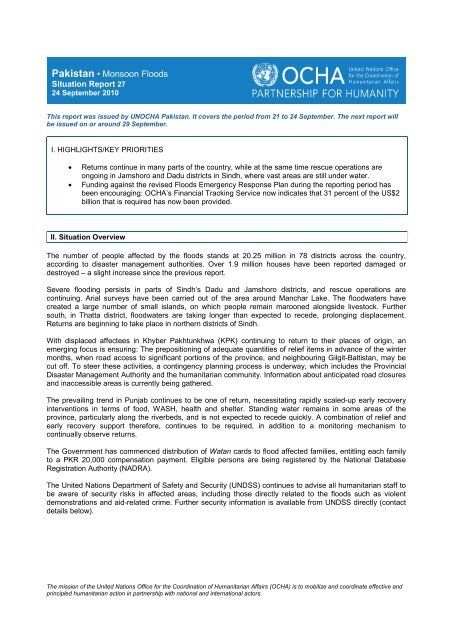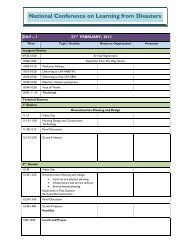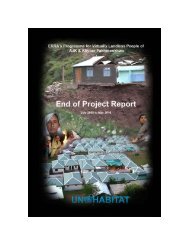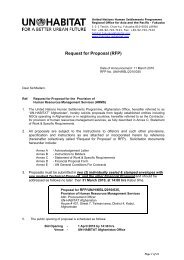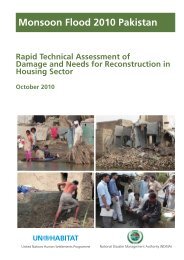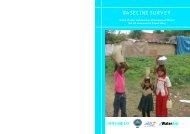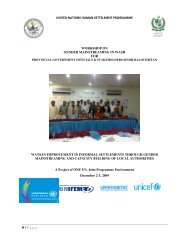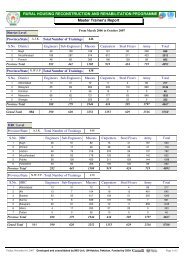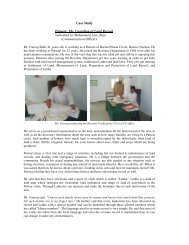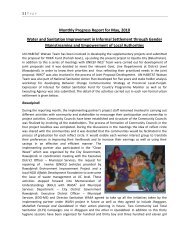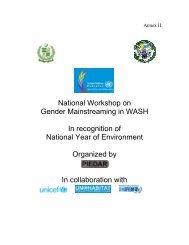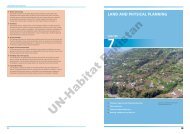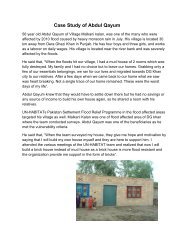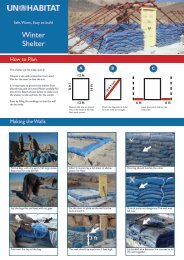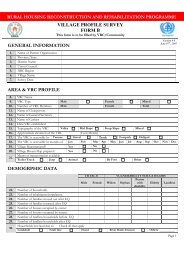Pakistan Floods OCHA sitrep 27 (24 Sept 2010). - UN-HABITAT ...
Pakistan Floods OCHA sitrep 27 (24 Sept 2010). - UN-HABITAT ...
Pakistan Floods OCHA sitrep 27 (24 Sept 2010). - UN-HABITAT ...
You also want an ePaper? Increase the reach of your titles
YUMPU automatically turns print PDFs into web optimized ePapers that Google loves.
<strong>Pakistan</strong> • Monsoon <strong>Floods</strong><br />
Situation Report <strong>27</strong><br />
<strong>24</strong> <strong>Sept</strong>ember <strong>2010</strong><br />
This report was issued by <strong>UN</strong><strong>OCHA</strong> <strong>Pakistan</strong>. It covers the period from 21 to <strong>24</strong> <strong>Sept</strong>ember. The next report will<br />
be issued on or around 29 <strong>Sept</strong>ember.<br />
I. HIGHLIGHTS/KEY PRIORITIES<br />
• Returns continue in many parts of the country, while at the same time rescue operations are<br />
ongoing in Jamshoro and Dadu districts in Sindh, where vast areas are still under water.<br />
• Funding against the revised <strong>Floods</strong> Emergency Response Plan during the reporting period has<br />
been encouraging: <strong>OCHA</strong>’s Financial Tracking Service now indicates that 31 percent of the US$2<br />
billion that is required has now been provided.<br />
II. Situation Overview<br />
The number of people affected by the floods stands at 20.25 million in 78 districts across the country,<br />
according to disaster management authorities. Over 1.9 million houses have been reported damaged or<br />
destroyed – a slight increase since the previous report.<br />
Severe flooding persists in parts of Sindh’s Dadu and Jamshoro districts, and rescue operations are<br />
continuing. Arial surveys have been carried out of the area around Manchar Lake. The floodwaters have<br />
created a large number of small islands, on which people remain marooned alongside livestock. Further<br />
south, in Thatta district, floodwaters are taking longer than expected to recede, prolonging displacement.<br />
Returns are beginning to take place in northern districts of Sindh.<br />
With displaced affectees in Khyber Pakhtunkhwa (KPK) continuing to return to their places of origin, an<br />
emerging focus is ensuring: The prepositioning of adequate quantities of relief items in advance of the winter<br />
months, when road access to significant portions of the province, and neighbouring Gilgit-Baltistan, may be<br />
cut off. To steer these activities, a contingency planning process is underway, which includes the Provincial<br />
Disaster Management Authority and the humanitarian community. Information about anticipated road closures<br />
and inaccessible areas is currently being gathered.<br />
The prevailing trend in Punjab continues to be one of return, necessitating rapidly scaled-up early recovery<br />
interventions in terms of food, WASH, health and shelter. Standing water remains in some areas of the<br />
province, particularly along the riverbeds, and is not expected to recede quickly. A combination of relief and<br />
early recovery support therefore, continues to be required, in addition to a monitoring mechanism to<br />
continually observe returns.<br />
The Government has commenced distribution of Watan cards to flood affected families, entitling each family<br />
to a PKR 20,000 compensation payment. Eligible persons are being registered by the National Database<br />
Registration Authority (NADRA).<br />
The United Nations Department of Safety and Security (<strong>UN</strong>DSS) continues to advise all humanitarian staff to<br />
be aware of security risks in affected areas, including those directly related to the floods such as violent<br />
demonstrations and aid-related crime. Further security information is available from <strong>UN</strong>DSS directly (contact<br />
details below).<br />
The mission of the United Nations Office for the Coordination of Humanitarian Affairs (<strong>OCHA</strong>) is to mobilize and coordinate effective and<br />
principled humanitarian action in partnership with national and international actors.
III. Humanitarian Needs and Response<br />
Camp Coordination and Camp Management<br />
Response: Good progress has been made on the joint planning of a camp profiling exercise in Sindh (PDMA,<br />
CCCM cluster and <strong>OCHA</strong>). A questionnaire has been endorsed and the methodology has been finalized with<br />
the National Commission for Human Development (NCHD), which will implement the project with support<br />
from the cluster lead. The exercise will be completed within ten days. The cluster continues to identify NGO<br />
partners to act as district-level CCCM focal points. Therefore, interested NGOs are highly encouraged to<br />
approach the cluster in Sukkur and Hyderabad. Three organized camps are being developed by district<br />
authorities in Dadu district, each hosting 500 families. Participatory Efforts for Healthy Environment, a local<br />
NGO, will implement the project. In Balochistan a system to map and profile camps has been finalized. The<br />
Baloch Rural Support Programme estimates that data collection will be complete in one week. District<br />
authorities in Nasirabad district in Balochistan, have requested the establishment of two camps, at Sohbatpur<br />
and Chattan Patti (250 families each). Hygiene conditions in camps in the district have improved. In Punjab,<br />
the Provincial Emergency Commissioner has released figures indicating that the numbers of people in<br />
temporary camps and schools is rapidly decreasing, confirming the need for scaled up shelter support in<br />
return areas.<br />
Gaps and Constraints: Despite progress on camp profiling, there continue to be significant gaps in information<br />
about the locations and populations of camps. It has been noted that in Balochistan new families are moving<br />
into camps as others return, as alternative accommodation is not available. These movements in and out of<br />
camps pose significant challenges.<br />
Education<br />
Needs: The number of schools reported as being used as shelters across the country has decreased further;<br />
692,000 people are now staying in 3,122 schools. Some 9,970 schools are now reported as damaged by the<br />
floods. Previously reported education needs persist – including temporary school structures, school supplies,<br />
tents, school-in-a-box kits and recreation kits – to ensure continuation of education during the transitional<br />
period.<br />
Response: The number of temporary learning centers (TLCs) established by the cluster has reached 454<br />
(benefiting 38,879 children). Some 415 adult literacy centers are benefiting 7,028 flood-affected adults. The<br />
cluster has distributed 396 school-in-a-box-kits, 503 recreation kits, <strong>27</strong>,753 school bags and a variety of other<br />
essential school supplies in flood- affected districts across the country. The cluster reports that the army plans<br />
to rehabilitate a total of 170 flood-damaged schools in Punjab’s D.G. Khan, Muzaffargarh, Rajanpur, Layyah<br />
and Multan districts. This work is already underway in 75 schools. 32 TLC teachers and NGO volunteers<br />
participated in a first phase of training in Hyderabad in Sindh. The Sindh provincial government has released<br />
funds for the initial cleaning and fumigation of schools in Khairpur and Sukkur districts.<br />
Food<br />
Needs: Preliminary results of rapid needs assessments in KPK, Punjab, Sindh and Balochistan suggest that<br />
10 million people are in need of food assistance. Further assessments are ongoing and will give a clearer<br />
picture of the numbers requiring food support, both in the forms of relief and early recovery.<br />
Response: The cluster is distributing both food rations and cash transfers to allow affectees to purchase food.<br />
Ready-to-use supplementary food is also being provided for children between the ages of 6 and <strong>24</strong> months,<br />
and high-energy biscuits to those aged between 2 and 12 years. Since the beginning of the flood response, it<br />
is estimated that at least 107,000 metric tonnes have been distributed to people in need. The Food Cluster is<br />
collaborating with the WASH and Health Clusters in the development of a survival strategy to ensure a more<br />
integrated, effective and timely survival response in priority flood affected districts.<br />
Gaps and Constraints: While many donors have announced pledges, the food cluster urges them to confirm<br />
their donations in order to ensure that sufficient food can be purchased and pre-positioned in target locations<br />
for October. WFP, which is providing 66 percent of current food assistance, is facing a shortfall of US$379<br />
million for its revised emergency operation, with a pipeline break expected in October <strong>2010</strong>. US$140 million<br />
The mission of the United Nations Office for the Coordination of Humanitarian Affairs (<strong>OCHA</strong>) is to mobilize and coordinate effective<br />
and principled humanitarian action in partnership with national and international actors.<br />
2
is required for October and November and, in view of the required lead-time to procure and transport food<br />
commodities, contributions must be confirmed immediately.<br />
Health<br />
Needs: There is a continuing need to closely monitor health alerts in the flood affected districts. Malaria is of<br />
increased concern, with over 163,639 suspected cases reported over the last three weeks. Consultations for<br />
suspected malaria continue to rise in Balochistan, Sindh, KPK and Punjab provinces. Acute diarrhea, acute<br />
respiratory infections, skin diseases and suspected malaria remain the leading causes of seeking health care<br />
in flood-affected areas. It is estimated that approximately 485,000 pregnant women are among the affected<br />
population, of which 50,000 are expected to require some form of specialised healthcare.<br />
Response: Since the start of the emergency, WHO has provided essential medicines for 4.8 million people,<br />
including medicines for 216,000 diarrhea treatments. These medicines have been distributed to partner<br />
organisations and health departments in affected districts. Distribution of 145,000 treated bed nets for malaria<br />
is continuing. The cluster responded to nine disease alerts during the reporting period (one for meningitis, the<br />
remainder for acute watery diarrhea). No deaths have been recorded since the last situation report. A polio<br />
and measles vaccination campaign began in Charsadda district on 20 <strong>Sept</strong>ember. WHO has begun a<br />
damage and needs assessment in Nasirabad, Jaffarabad and JhalMagsi districts in Balochistan, with support<br />
from the Asian Development Bank, the World Bank, the Ministry of Health, the Ministry of Population Welfare<br />
and Provincial Health Departments.<br />
Gaps and Constraints: A lack of human resources including surveillance officers and female health care<br />
providers and vaccinators persists in the flood affected areas. Some areas still remain inaccessible to health<br />
responders in Sindh due to protracted flooding. Strengthened monitoring and evaluation has been identified<br />
as a need within the cluster. Standard reporting formats for disease early warning and diarrhea treatment<br />
centres are needed.<br />
Logistics<br />
Response: Since 5 August, the cluster has facilitated the delivery by air of 3,380 mt of relief cargo. Two more<br />
<strong>UN</strong>HAS helicopters have arrived in <strong>Pakistan</strong> and are being configured in preparation for operations. This<br />
brings the total Number of <strong>UN</strong>HAS aircrafts in <strong>Pakistan</strong> to seven. The cluster is working to establish a fixedwing<br />
relief cargo delivery route from Chaklala to Skardu for pre-winter deliveries. Shipping company, Maersk<br />
Line, through the Logistics Emergency Team (LET), has offered to support the Logistics cluster by offering<br />
free ocean freight (containerized cargo) from anywhere in the world to Port Qasim, <strong>Pakistan</strong>. Interested<br />
organisations should submit a Cargo Movement Request form by 3 October<br />
(http://www.logcluster.org/ops/pak09a). An additional Mobile Storage Unit (MSU) has been erected at the<br />
WFP compound in Multan and is available for use by cluster participants. Another MSU is planned in the<br />
same location.<br />
Gaps and Constraints: The cluster urgently requires information on the quantities of non-food items which<br />
participants aim to deliver before the onset of winter for planning purposes. Information should be sent to:<br />
pakistan.logs@logcluster.org<br />
Mass Communications<br />
Response: A Service Handbook for Sindh detailing humanitarian services and their access procedures (a<br />
humanitarian “Yellow Pages”) has been printed and is being distributed to local organizations and government<br />
officials. IOM is providing information and service directories to the protection cluster in Peshawar to support<br />
various assessments in the province. New ‘humanitarian call points’ are being established in partnership with<br />
Zong telecommunications provider. These call points will be established and managed with assistance from<br />
local organizations in KPK, Punjab and Sindh. Call points provide 800 free minutes of calls each day to allow<br />
flood-affected families to contact relatives and humanitarian services. The Humanitarian Call Center in<br />
Peshawar is consolidating cross-cutting information on flood-affectees from Mass Communications Focal<br />
Points in field teams in the Peshawar Valley. On 21 <strong>Sept</strong>ember, the Humanitarian Call Centre identified 55<br />
displaced families without shelter in Aza Khel, Peshawar. The next day, those families received shelter as a<br />
consequence of the team alerting the humanitarian community to the need. Public Service Announcements<br />
The mission of the United Nations Office for the Coordination of Humanitarian Affairs (<strong>OCHA</strong>) is to mobilize and coordinate effective<br />
and principled humanitarian action in partnership with national and international actors.<br />
3
(PSAs) are being broadcast on local FM radio stations in KPK regarding (i) how the public can give feedback<br />
on the housing survey conducted by PDMA in the province and (ii) details of food package distributions by the<br />
World Food Program (WFP). Broadcasts were aired from 18 to <strong>24</strong> <strong>Sept</strong>ember.<br />
Protection<br />
Needs: There is now an urgent need to setup mechanisms to monitor the return of flood displaced people and<br />
to reinforce the delivery of coordinated recovery assistance. Lack of access to and discrimination in<br />
distribution of assistance remain critical protection concerns across Sindh, Punjab and Balochistan. IDPs<br />
stranded in isolated locations in Balochistan are in particularly urgent need. The cluster continues to receive<br />
increased reports of gender-based violence, notably in Balochistan. The child protection sub-cluster continues<br />
to identify unaccompanied, separated and missing children. The cluster notes a need to scale up registration<br />
and compensation of flood affected persons; out of 20 million affected persons, so far only 91,517 families<br />
(approximately 549,102 individuals) have been processed by NADRA as of 23 <strong>Sept</strong>ember.<br />
Response: Camp profiling of over 4,000 camps in Sindh will begin tomorrow, with a report on findings due by<br />
early October followed by more protection-focused rapid protection assessments (RPA). Results of RPAs<br />
from KPK and Sindh are due in October. Preliminary assessment findings for various districts have already<br />
been issued and are informing existing and new protection coordination units set up in parts of Punjab, and<br />
Nasirabad and Hyderabad in Sindh.<br />
Gaps and Constraints: Security concerns continue to restrict the cluster’s activities in some areas –<br />
particularly in Balochistan and Sindh during the reporting period. Tribal tensions in Barkhan area hamper<br />
delivery of assistance and recent political events have had repercussions on security with further disturbances<br />
expected. Damage to infrastructure continues to restrict access to parts of KPK and Gilgit-Baltistan. Though<br />
some improvements have been seen over the past week, the protection cluster needs to further scale up its<br />
activities in Sindh.<br />
Shelter and NFIs<br />
Needs: Latest Government figures show that over 1.9 million houses have been damaged or destroyed, with<br />
1.1 million in Sindh alone. At present, over 1.25 million households are yet to receive emergency shelter<br />
material. As the winter months are approaching, there is a need for the provision of blankets and winter<br />
clothing; many families have only one set of clothing. Only three cluster agencies are currently active in the<br />
<strong>Pakistan</strong>-administered Khashmir, where additional support is needed, especially in Neelum, where access<br />
may be cut off by October.<br />
Response: The cluster is now working closely with other clusters to support returns from schools and public<br />
buildings and is coordinating closely with the food cluster to access hard to reach areas in Punjab. In Sindh a<br />
technical sub-committee of the PDMA is finalizing shelter design in collaboration with the shelter cluster. IOM<br />
will construct a model shelter from this design. Sindh PDMA has requested Shelter cluster to provide shelter<br />
support in setting up planned settlements. At the national level, the cluster has so far distributed over 225,000<br />
tents and 314,800 plastic sheeting to over 380,000 families. Cluster members have also distributed 9,000 tool<br />
kits, 550,500 blankets and 1<strong>27</strong>,000 kitchen sets, 84,000 tents and 422,000 plastic tarpaulins are reported to<br />
be in the pipeline, as well as 29,000 tool kits, 98,000 kitchen sets. For more information and daily gap<br />
analysis updates, please see www.shelterpakistan.org<br />
Gaps and Constraints: At present, over 1.25 million households are yet to receive emergency shelter material.<br />
There is concern that it may not be possible to rebuild in areas where soil is still saturated for several months.<br />
Shelter cluster members in Punjab and Sindh have reported incidents of aggressions at distribution points<br />
and looting of relief transport. Expected price inflation of construction material will also be a challenge in<br />
coming days and weeks.<br />
WASH<br />
Response: The WASH cluster now includes 101 agencies, and is supplying potable water to 3.63 million<br />
people. The supply of hygiene kits distributed covers more than 1.4 million people. Latrine coverage has<br />
been provided to more than 428,000 people and bathroom coverage to 236,000. Dissemination of hygiene<br />
The mission of the United Nations Office for the Coordination of Humanitarian Affairs (<strong>OCHA</strong>) is to mobilize and coordinate effective<br />
and principled humanitarian action in partnership with national and international actors.<br />
4
promotion messages through inter-personal communication has reached more than 409,000 people. The<br />
national WASH Cluster is preparing a monitoring and assessment plan to strengthen the areas with gaps.<br />
Assessments are especially critical now to gain a better picture of WASH needs at district level. The Aga<br />
Khan Rural Support Programme (AKRSP) has formally taken over the role of WASH Cluster Coordination in<br />
Gilgit-Baltistan. In Sindh, the Sukkur WASH Cluster is developing a water quality strategy for ensuring<br />
appropriate chlorination of tankered water. Sanitation coverage remains low in many areas, including in<br />
Punjab, where IOM will facilitate a social mobilization training for WASH Cluster partners. The cluster has<br />
received in kind donation of aquatabs, hygiene kits, jerry cans, buckets and soap bars from CIDA, OFDA,<br />
AusAID and DFID; distributions are ongoing.<br />
IV. Coordination<br />
<strong>OCHA</strong> continues to operate Humanitarian Coordination Centres (HCCs) in Peshawar (covering KPK), Multan<br />
(covering Punjab), Sukkur (covering northern Sindh) and Hyderabad (covering southern Sindh). <strong>UN</strong>HCR is<br />
leading coordination in Balochistan. Progress is being made in all provinces on the establishment of districtlevel<br />
coordination structures. Further information on coordination is available on the response website:<br />
http://www.pakresponse.info/<br />
For details on visas-on-arrival for humanitarian workers, tax/duty free import of relief goods and obtaining No<br />
Objection Certificates (NOCs) for operations in flood-affected areas, please contact Nicki Bennett in <strong>OCHA</strong><br />
<strong>Pakistan</strong> (contact details below). For details on security clearance for travel to restricted areas (which include<br />
all 7 FATA agencies, several flood-affected districts of Balochistan and D.G. Khan in Punjab) please contact<br />
Alexander Hasenstab in <strong>OCHA</strong> <strong>Pakistan</strong> (contact details below).<br />
V. Funding<br />
<strong>OCHA</strong>’s Financial Tracking Service (FTS) indicates a significant increase in funds provided against the<br />
revised <strong>Floods</strong> Emergency Response Plan during the reporting period, with US$ 615.6 million now committed<br />
or contributed to projects in the appeal (31 percent of overall requirements).<br />
Detailed information on funds committed and pledged so far is available on the FTS website, at:<br />
http://www.reliefweb.int/rw/fts.nsf/doc105OpenForm&rc=3&emid=FL-<strong>2010</strong>-000141-PAK<br />
The mission of the United Nations Office for the Coordination of Humanitarian Affairs (<strong>OCHA</strong>) is to mobilize and coordinate effective<br />
and principled humanitarian action in partnership with national and international actors.<br />
5
For details on how to contribute to the PIFERP or the Emergency Response Fund for <strong>Pakistan</strong>, please<br />
contact Susan le Roux in <strong>OCHA</strong> <strong>Pakistan</strong> (contact details below).<br />
VI. Contact<br />
<strong>OCHA</strong> <strong>Pakistan</strong>:<br />
Manuel Bessler, Head of Office<br />
bessler@un.org<br />
Stacey Winston, Public Information Officer<br />
winston@un.org, +92 300 850 2690<br />
Nicki Bennett, Senior Humanitarian Affairs Officer<br />
bennett5@un.org, +92 300 850 2289<br />
Susan le Roux, External Relations and Donor<br />
Liaison Officer<br />
leroux@un.org, +92 308 520 5819<br />
FawadHussain, Sindh Coordination Centre<br />
(contact point for northern and southern Sindh)<br />
fawad.hussain@un.org, +92 301 854 <strong>24</strong>95<br />
HussainUllah, Punjab Coordination Centre<br />
ullah5@un.org, +92 301 854 <strong>24</strong>49<br />
Waheed Anwar, Khyber Pakhtunkhwa<br />
Coordination Centre<br />
anwarw@un.org, +92 301 854 <strong>24</strong>72<br />
Alexander Hasenstab, <strong>UN</strong>DSS NGO Liaison<br />
Officer<br />
hasenstab@un.org, +92 345 850 9011<br />
<strong>UN</strong>DSS Security Information Operations Centre:<br />
unsiocpakistan@undp.org<br />
<strong>OCHA</strong> Geneva<br />
Randa Hassan, Humanitarian Affairs Officer<br />
hassan50@un.org,<br />
Office: +41 22 917 <strong>27</strong>32 - Cell: +41 79 602 3598<br />
<strong>OCHA</strong> New York:<br />
Ben Negus, Humanitarian Affairs Officer<br />
negus@un.org,<br />
Office: +1 917 367 4374 - Cell: +1 646 785 9642<br />
The mission of the United Nations Office for the Coordination of Humanitarian Affairs (<strong>OCHA</strong>) is to mobilize and coordinate effective<br />
and principled humanitarian action in partnership with national and international actors.<br />
6


